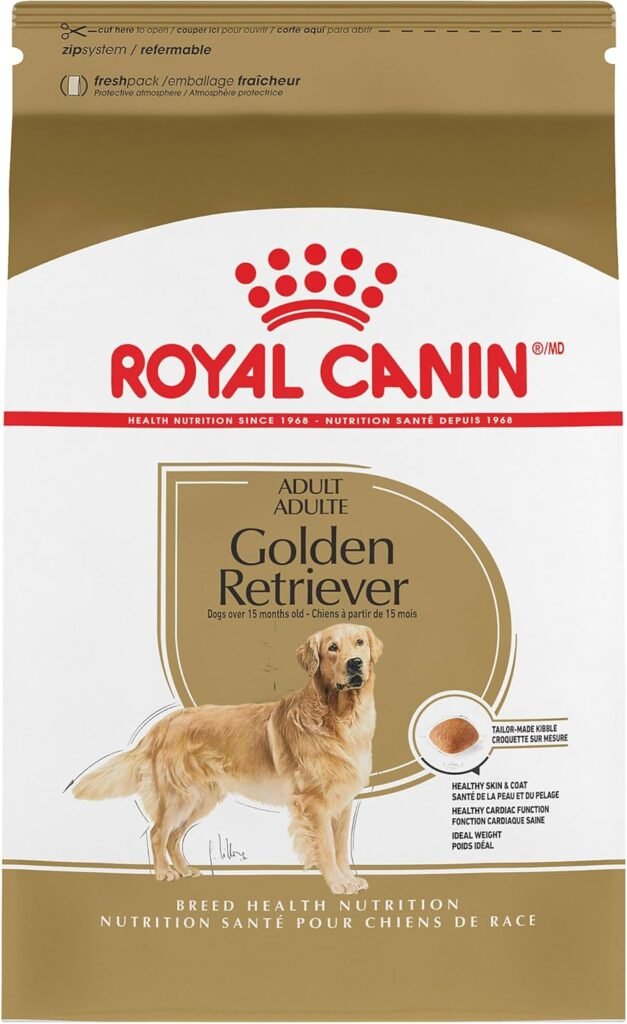You’ve probably heard of the Golden Retriever, a breed known for its distinctive golden coat, bright color, and cheerful personality. These dogs are famous for their soft ears and affectionate nature towards humans.
Introduction to the Golden Retriever Breed
The Golden Retriever was first developed in Scotland in the 19th century and gained popularity after World War I. It is now recognized by international kennel clubs. Golden Retrievers are medium-sized dogs, known for their thick, golden coats. They are intelligent, friendly, and make excellent family pets, especially with children. Their coat color typically ranges from light to dark gold.
In terms of health, Golden Retrievers are generally robust, but they are prone to certain health issues such as bloat, allergies, and cancer. A balanced diet and regular exercise are crucial to maintaining their health.
Golden Retrievers are highly trainable and intelligent, making them suitable for various roles, such as guide dogs for the visually impaired or therapy dogs. Caring for a Golden Retriever requires attention to vaccinations, regular health check-ups, and physical activities. They need moderate to high levels of exercise and enjoy activities like walking, running, and swimming.
Characteristics of the Golden Retriever
Golden Retrievers are beloved worldwide. They are known for their friendly temperament, intelligence, and high trainability. Here are some reasons why Golden Retrievers are a popular choice as a companion:
- Friendly Nature: Golden Retrievers are famous for their friendly and loving disposition. They enjoy being around people and are very affectionate.
- Easy to Train: Thanks to their intelligence and eagerness to please, Golden Retrievers are easy to train. They learn quickly and effectively respond to commands.
- Great with Children: Golden Retrievers are typically gentle and patient with children. They enjoy playing and can be wonderful companions for kids.
- Active and Enjoy Outdoor Activities: Golden Retrievers love exercise and outdoor activities like walking, running, and swimming, making them ideal for active individuals.
- Ideal for Rescue and Therapy Work: Their gentle nature and intelligence also make Golden Retrievers excellent candidates for rescue and therapy roles, helping those who need special care.
However, before deciding to adopt a Golden Retriever, you should be aware of their care requirements and ensure they have a suitable living environment. Golden Retrievers need ample space for exercise and activity, as well as time and attention from their owners.
How to Care for a Golden Retriever

Golden Retrievers are friendly dogs that enjoy playing and can adapt to various climates. Ensure they have enough space for regular exercise to maintain good health.
- Establish a Feeding Schedule: To keep your dog on a regular eating routine, establish a consistent daily feeding schedule. Golden Retrievers typically need 2 to 3 meals per day.
- Adequate Exercise: Golden Retrievers require sufficient exercise to stay healthy and happy. Walking, playing, and engaging with your dog are great ways to keep them active.
- Training and Discipline: Training a Golden Retriever is essential to integrate them as a well-behaved family member. Use positive reinforcement and gentle discipline techniques.
Caring for and raising a Golden Retriever is a loving and responsible process. Providing the right diet, healthcare, and emotional care will help your dog live a happy and healthy life. Here are some essential items for your Golden Retriever:
- Collar and Leash: Choose a collar and leash that are the right size and material for your dog’s size and activity level. Ensure they are comfortable and do not cause any pain. Always use a collar and leash with safety features to prevent injury or loss.
- Toys: Provide plenty of toys and activities to reduce stress and strengthen your bond with your dog. Golden Retrievers enjoy chew toys and interactive games.
- Comfortable Bedding: Make sure your dog has a cozy place to rest with a soft bed or mat. This helps protect their bones and joints from hard surfaces.
- Food and Water Bowls: Provide clean and easily accessible food and water bowls for your dog.
- Bathing and Grooming: Regularly bathe your Golden Retriever to keep their coat clean and odor-free. Use quality grooming products and care for their ears and nails. Golden Retrievers need regular brushing and trimming to prevent matting and maintain a shiny coat.
- Crate: Consider having a crate or kennel for your dog to provide a safe place when you’re not around.
Nutrition and Diet for Golden Retriever
To ensure your Golden Retriever has a healthy and happy life, proper nutrition and a balanced diet are crucial. Here’s an overview of the diet and best foods for Golden Retrievers:
- Dry Dog Food: Kibble is a popular choice for Golden Retrievers. Make sure to select high-quality kibble that is rich in protein and nutrients. Adjust the amount of food according to your dog’s age and activity level to prevent underweight or overweight issues.
- Fresh Food: If you prefer feeding fresh food, ensure it meets your dog’s nutritional needs, including meat, vegetables, and other ingredients. Consult with your veterinarian about a fresh food diet for your dog.
- Mixed Diet: Some people choose to combine kibble and fresh food for their Golden Retrievers, ensuring they receive all necessary nutrients.
- Special Nutritional Foods: For Golden Retrievers with health issues or allergies, special nutritional food might be required. Consult your veterinarian for these options.
Royal Canin understands what makes your Golden Retriever exceptional, offering a specially crafted, breed-specific diet tailored to their unique needs.
Best Foods for Golden Retriever
- Chicken and Duck: Golden Retrievers love chicken and duck, which provide high-quality protein to help build muscle.
- Green Vegetables: Vegetables like spinach, zucchini, and pumpkin offer essential fiber and vitamins for digestive health and overall well-being.
- Grains: Barley, pumpkin seeds, and oats can be added to their diet for energy and fiber.
- Fish: Fish is an excellent source of Omega-3 fatty acids, which are beneficial for heart health and a shiny coat.
- Functional Foods: Special functional foods are available to help maintain muscle mass, support joint health, and more.
Proper nutrition is vital to ensure your Golden Retriever lives a healthy and happy life. Always research your dog’s specific nutritional needs and consult your veterinarian to provide the most suitable diet. Proper attention to your dog’s diet will help them live a long and loving life by your side.
Tips for Training a Golden Retriever
Based on research from reputable sources, we’ve compiled some tips and methods for training your Golden Retriever:
- The “Angel” Stage (2-6 months): Training should begin immediately with group classes and basic commands. Golden Retrievers are eager and easy to train at this age, making it the perfect time to bond, build trust, and explore your dog’s natural abilities.
- Training “Sit” and “Stay”: These are basic yet essential commands. Use positive reinforcement, like treats, to train your Golden Retriever.
- Importance of Socialization: It’s crucial to help your Golden Retriever understand and adapt to their environment, including strangers and different household sounds.
- Training Tricks: Add tricks like rolling over, spinning, fetching, shaking hands, and speaking to strengthen your bond with your Golden Retriever. Playing fetch is a great way to keep them physically and mentally stimulated.
- Using Training Principles: Consistency is key. Establish a consistent routine and clearly define what you expect from your Golden Retriever. Use praise and treats to encourage good behavior.
- Specialized Training: Start basic training as early as possible, ideally when your Golden Retriever is 8-10 weeks old. Specialized training should begin after completing basic training, usually between 6-12 months of age.
- Important Skills for Puppies: Teach skills like “leave it” and “drop it” to help your dog learn to give up objects without conflict. Additionally, help them learn to socialize carefully.
- Training Not to Bite and Using a Leash: Teach your Golden Retriever not to bite and how to use a leash properly, combining praise and treats when they perform correctly.
Health and Common Issues
Golden Retrievers are a popular and beloved breed, but they are also prone to certain health issues:
- Heart Disease: Golden Retrievers can suffer from heart problems like thrombosis or congenital heart defects. Symptoms may include difficulty breathing, fatigue after exercise, or even sudden death.
- Bloat (Gastric Dilatation-Volvulus): This condition causes the stomach to fill with gas and twist, putting pressure on other organs and can be fatal if not treated quickly.
- Cataracts and Glaucoma: Golden Retrievers are at higher risk for eye diseases like cataracts and glaucoma, which can lead to blindness if untreated.
- Cancer: Golden Retrievers have a higher rate of cancer than many other breeds, with common types including lymphoma and hemangiosarcoma.
- Skin Allergies: Symptoms like redness, itching, and hair loss are common due to allergies.
- Joint Problems: Joint issues like hip and elbow dysplasia are common health concerns in this breed.
- Epilepsy: Epilepsy in Golden Retrievers is often genetic and requires management with medication and regular veterinary monitoring.
To prevent and minimize health risks in Golden Retrievers, regular health check-ups, a balanced diet, and appropriate physical activity are essential. Choosing dogs from reputable breeders who conduct health screenings can help reduce the risk of hereditary health issues.






